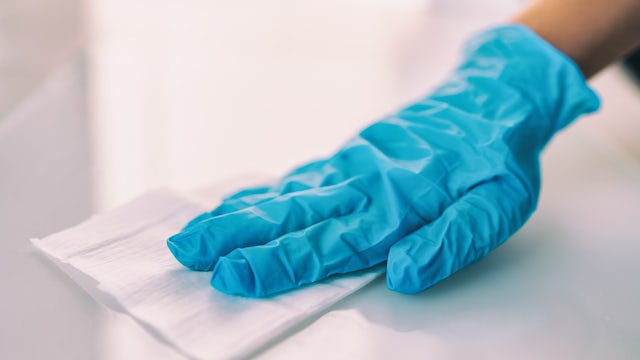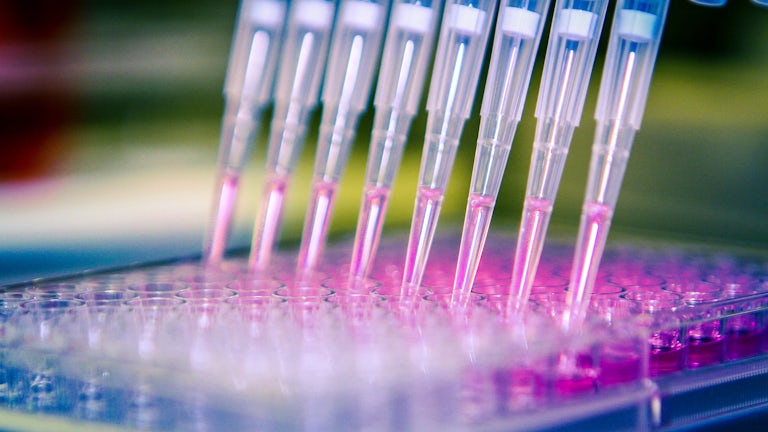
Improving the effectiveness of antimicrobial wipes in healthcare settings
Professor Jean-Yves Maillard’s research, into the effectiveness of antimicrobial wipes, has led to improved infection control measures, a new international standard for testing pre-wetted anti-bacterial wipes, and significant commercial growth for a leading manufacturer of anti-bacterial cleaning products.
Effectiveness of antimicrobial wipes
A recent paper in the Lancet stated that 1.27 million people died worldwide because of antimicrobial resistant infections in 2019. Preventing these infections is more important than ever, and clean surfaces in healthcare settings are a key part of the solution.
Antimicrobial wipes are used to decontaminate surfaces in healthcare, to reduce the risk of patients getting infections. Not much was known about the effectiveness of these anti-bacterial products, or which were the most effective in destroying bacterial pathogens. There was also no evidence about how wipes should be used in clinical settings for effective infection control.
In 2006, the Welsh Government approached Professor Maillard – following his extensive research expertise on antimicrobial biocides and microbial resistance – to investigate the effectiveness of antimicrobial wipes for infection control in Welsh intensive care units. This led to the development of a comprehensive test protocol, measuring the efficacy and risk associated with wipe-based products.
Professor Maillard went onto assess how effective commercially available sporicidal wipes were at removing spores of Clostridioides difficile (C diff) from an inanimate surface. He evaluated a range of factors, including the nature and concentration of the biocides used in the wipe and the wipe material itself. Maillard also looked at the nature of the surfaces that needed to be decontaminated, the target pathogens, and the way in which the wipe was being physically used by healthcare and cleaning staff.
He discovered that many of the antimicrobial wipes being used to reduce the spread of bacteria in hospitals were ineffective, and could unintentionally contribute to the spread of potentially fatal pathogenic bacteria.
The work also found that claims made by wipe manufacturers around the antimicrobial effectiveness of their wipes could not be backed up in practice.
“When I started to look at the products being used, I discovered that the antimicrobial activity claims for some products were not good and couldn’t be substantiated,” explains Professor Maillard.
He also found that no effective testing protocol existed for these products and that a sufficiently robust and standardised ‘biocide wipe testing procedure’ was needed.
Developing a new protocol
Professor Maillard worked with the inventors of a textile testing device called the Wiperator®, which is manufactured in Canada. Previously, the Wiperator® could only test the material used in wipe manufacturing. Using Professor Maillard’s research, changes were made to the device so that it could assess the effectiveness of wipes with different biocide formulations. The device was also modified so wipes could also be tested with real-life use conditions, such as applied force, rubbing speed and duration of wiping.
Professor Maillard, and his research group, used the modified Wiperator® to develop a new standard protocol for the testing and clinical use of antimicrobial wipes.
“We developed a method in the lab that was based on three parts, which was the actual efficacy of the wipe itself to remove microorganisms on surfaces, the efficacy of the wipe to kill microorganisms in the wipes, and the efficacy of the wipes to stop transferring microorganisms between surfaces,” Professor Maillard explains.
The research found that even when a wipe is proven to eliminate bacteria, it must be used in a certain way to be effective in minimising the spread of bacteria.
“It’s important that the wipes remove things from the surface, but it’s equally important that they do not transfer microorganisms across surfaces. We came up with a way to do this – one wipe, used on one surface, and in one direction,” Professor Maillard adds.
Using the wipe in this way prevents it from spreading bacteria from one surface to another, or from one area to another when used on numerous surfaces or in several directions.
Using this new protocol, Professor Maillard was able to clearly demonstrate which products were effective, and how they should be used safely to minimise the spread of potentially fatal pathogenic bacteria.
The protocol Professor Maillard developed underpinned a new American Society for Testing and Materials (ASTM) International Standard, for the testing and use of antimicrobial wipes. ASTM is an international organisation that develops and publishes technical standards for materials, products, systems, and services.
Partnership with GAMA Healthcare Ltd
The development of this protocol was used to establish the sporicidal activity of commercially available products claiming activity against Clostridioides difficile. Professor Maillard identified that one product was superior to those produced by competitors. This product was GAMA Healthcare’s Clinell Sporicidal wipe.
The clinical trials run by the university – the first of their kind – provided the clinical proof needed by healthcare customers and regulators. It was shown that GAMA’s wipes are effective against C diff, killing 99.9999% of spores in just one minute.
“It was absolutely clear when we compared their product with the others, that their product was much better. That was the starting point for them to really be able to make a strong claim based on the publication of our paper,” Professor Maillard says.
This led to a long-term collaboration between the university and GAMA Healthcare Ltd, supported via four Knowledge Transfer Partnerships, funded by Innovate UK. This collaboration and transfer of knowledge helped the company to set up and run clinical trials and train staff across multiple departments. It also allowed for the development of the next generation of products, and lay the foundation for in-house research and development capability.
The partnership was rated highly by Innovate UK who graded the project ‘outstanding’. These achievements were also recognised at Cardiff University’s Innovation and Impact Awards 2015, winning the Business Innovation Award, and elected the ‘People’s Choice’ winner, which is an award voted for by the general public. The partnership also won the Insider’s (Wales) Business and Education Partnerships Awards 2015, in the category of Research and Development.
GAMA Healthcare Ltd is now a UK market leader in the antimicrobial wet wipe product industry. They are one of the largest suppliers of wet wipes to the NHS in the United Kingdom and export products all over the world.
“Interaction with industry is crucial to optimise research application ‘in the real world’ and create impactful innovation – here, ensuring the product used as part of an infection control regimen in healthcare settings can make a difference, and help infection control against troublesome pathogens,” Professor Maillard says.
As new products are developed, and formulations improved, Professor Maillard continues to use his expertise, contributing to the global effort to minimise healthcare acquired infections.

Research in the School of Pharmacy and Pharmaceutical Sciences
The excellence of our pharmaceutical science and health related research is recognised internationally. It spans the complete continuum, from basic to applied translational science and clinical practice.
People

Professor Jean-Yves Maillard
Professor of Pharmaceutical Microbiology
- maillardj@cardiff.ac.uk
- +44 (0)29 2087 9088
Publications
- Siani, H. , Wesgate, R. and Maillard, J. 2018. Impact of antimicrobial wipes compared with hypochlorite solution on environmental surface contamination in a health care setting: a double-crossover study. American Journal of Infection Control 46 (10), pp.1180-1187. (10.1016/j.ajic.2018.03.020)
- Sattar, S. et al., 2015. Disinfectant wipes are appropriate to control microbial bioburden from surfaces: use of a new ASTM standard test protocol to demonstrate efficacy. Journal of Hospital Infection 91 (4), pp.319-325. (10.1016/j.jhin.2015.08.026)
- Ramm, L. et al. 2015. Pathogen transfer and high variability in pathogen removal by detergent wipes. American Journal of Infection Control 43 (7), pp.724-728. (10.1016/j.ajic.2015.03.024)
- Siani, H. , Cooper, C. and Maillard, J. 2011. Efficacy of 'sporicidal' wipes against Clostridium difficile. American Journal of Infection Control 39 (3), pp.212-218. (10.1016/j.ajic.2011.01.006)
- Williams, G. J. et al. 2009. Limitations of the efficacy of surface disinfection in the healthcare setting. Infection Control and Hospital Epidemiology 30 (6), pp.570-573. (10.1086/597382)
- Williams, G. J. et al. 2007. The development of a new three-step protocol to determine the efficacy of disinfectant wipes on surfaces contaminated with Staphylococcus aureus. Journal of Hospital Infection 67 (4), pp.329-335. (10.1016/j.jhin.2007.08.012)

